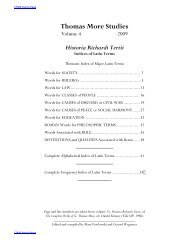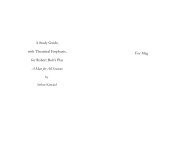life of john picus earl of mirandola - The Center for Thomas More ...
life of john picus earl of mirandola - The Center for Thomas More ...
life of john picus earl of mirandola - The Center for Thomas More ...
Create successful ePaper yourself
Turn your PDF publications into a flip-book with our unique Google optimized e-Paper software.
5<br />
10<br />
15<br />
20<br />
25<br />
Twelve Rules <strong>of</strong> Spiritual Battle<br />
Lacking discretion they compare and apply°<br />
Of their foul sin the voluptuous delight<br />
To the labourous travail <strong>of</strong> the conflict and fight. ∆1<br />
And yet alas he that <strong>of</strong>t hath known<br />
What grief it is by long experience<br />
Of his cruel enemy to be overthrown,<br />
Should once at the leastwise do his diligence<br />
To prove and essay° with manly defence<br />
What pleasure there is, what honour, peace and rest<br />
In glorious victory, triumph and conquest. ∆2<br />
<strong>The</strong> Twelfth Rule.<br />
Though thou be tempted, despair thee nothing: 3<br />
Remember ⌐ the glorious apostle Saint ¬ Paul<br />
When he had seen God in His perfect being,<br />
Lest such revelation should his heart extol,<br />
His flesh was suffered rebel against his soul:<br />
This did almighty God <strong>of</strong> His goodness provide<br />
To preserve His servant from the danger <strong>of</strong> pride. 4<br />
And here take heed that he whom God did love, ∆5<br />
And <strong>for</strong> His most especial ∆6 vessel chose,<br />
Ravished into the third heaven above,<br />
1 apply compare, weigh against / 9 essay assay, put to the test<br />
Δ1. But like . . . fight: In these four lines, <strong>More</strong> significantly expands and alters the Latin Sed<br />
comparant pugnam voluptati, “Rather they compare the battle with the pleasure” (CW 1:374, 375).<br />
Δ2. And yet . . . conquest: In these seven lines, <strong>More</strong> significantly expands and alters the Latin<br />
& tamen homo qui milies expertus est quid sit cedere tentationi deberet semel saltem experiri quid sit vincere<br />
tentationem, “and yet a person who has experienced a thousand times what it is like to yield to<br />
temptation should experience at least once what it is like to conquer temptation” (CW 1:374, 375).<br />
3. Though thou . . . nothing: Here <strong>More</strong> condenses the Latin propterea quod tentaris ne credas te a deo<br />
derelictum aut deo parum gratum esse aut parum iustum & perfectum, “just because you are tempted, do<br />
not think that God has abandoned you or that you are less pleasing to God or less righteous<br />
and perfect” (CW 1:374, 375).<br />
4. Paul . . . <strong>of</strong> pride: Here and in the following lines (57.23–58.1), the allusion is to 2 Corinthians<br />
12:1–10, wherein Saint Paul says he received “a thorn . . . in the flesh, a messenger <strong>of</strong> Satan, to<br />
harass [him], to keep [him] from being too elated” (RSV).<br />
Δ5. he whom God did love: <strong>The</strong> Latin is Paulus (CW 1:374).<br />
Δ6. most especial: <strong>The</strong> Latin is electionis, “chosen” (CW 1:374, 375).<br />
57<br />
[109]











